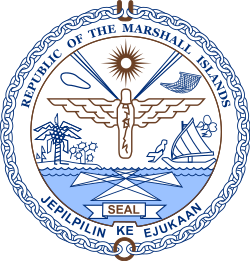| Country | Notes |
|---|
 Equatorial Guinea Equatorial Guinea | In August 2022, Equatoguinean forces boarded a Marshallese-flagged ship off its coasts and detained the ship's crew and kept them in custody for over nine months before deporting them. [9] As a consequence, the Marshallese government sued Equatorian Guinea before the International Tribunal for the Law of the Sea and demanded nearly 60 million dollars in reparations over unlawful detention, crew mistreatment and damage to reputation. The case opened in early October 2025. [10] |
 India India | See India–Marshall Islands relations As per the Ministry of External Affairs of the Government of India, India established diplomatic relations with Republic of the Marshall Islands in April 1995. Development assistance from India has included a grant of US$100,000 in June 2008 for a solar street lighting project in the capital city of Majuro and grant of 5 ITEC scholarships in November 2010. Marshall Islands has been supportive of issues of importance to India, particularly Indian candidature to international organizations. It supported India's candidature for the non-permanent membership of the UN Security Council for the 2011–12 term. Presently, there are about 10 Indian nationals in the Marshall Islands. [11] |
 Israel Israel | See Israel–Marshall Islands relations |
 Kosovo Kosovo | See Kosovo–Marshall Islands relations The Marshall Islands officially recognised the independence of the Republic of Kosovo on the 17 April 2008. [12] |
 Micronesia Micronesia | See Marshall Islands–Federated States of Micronesia relations The Marshall Islands and Micronesia share very good relations, as they are both bound by Compacts of Free Association with the United States. |
 Mexico Mexico | - Marshall Islands does not have an accreditation to Mexico
- Mexico is accredited to the Marshall Islands from its embassy in Manila, Philippines. [13] [14]
|
 Palau Palau | See Marshall Islands–Palau relations The Marshall Islands and Palau share very good relations, as they are both bound by Compacts of Free Association with the United States. |
 South Korea South Korea | - Bilateral trade of both countries in 2020 were about 4.83 billion $. [15]
|
 Turkey Turkey | |
 United Kingdom United Kingdom | See Marshall Islands–United Kingdom relations The Marshall Islands established diplomatic relations with the United Kingdom on 2 February 1992. - The Marshall Islands does not maintain an embassy in the United Kingdom.
- The United Kingdom is not accredited to the Marshall Islands through an embassy; the UK develops relations through its high commission in Suva, Fiji. [17]
Both countries share common membership of the International Criminal Court, the United Nations, and the World Health Organization. Bilaterally the two countries have a Tax Information Exchange Agreement. [18] |
 United States United States | See Marshall Islands–United States relations The Marshall Islands and the United States maintain a strong and stable relationship under the Compact of Free Association. The US has full responsibility in the country's defense, financial aid, and social services. In return, the U.S. provides healthcare services, security, and freedom of movement between U.S., American Samoan, and Marshall Islander citizens. In international politics, Marshall Islands has often voted with the United States with respect to United Nations General Assembly resolutions. [19] |

